-------------------------------------------------------------
Edutopia - JIM SILL
-------------------------------------------------------------
[00:00:01]
Sill: The look on a kid's face, to realize that three or four weeks ago they had nothing but an idea. And now, they've impacted kids emotionally. They've literally had an emotional experience watching their film. I love that, uhh, kids have the opportunity to get that from a classroom like this.
[TITLE - "TECH 2 LEARN"]
[00:00:28]
Sill: [TO STUDENTS:] And then, you guys don't go on until Friday, right?
F: Nope.
[00:00:30]
Sill: [TO CAMERA:] I teach three different classes. The "Intro to Video" class is where kids work on projects that are cross-curricular. Umm, they learn how to shoot; they learn how to edit. Uhh, they also learn how to research. They learn how to write. It's a ... it's a wonderful introductory class to the rest of the program.
[00:00:44]
M: Here we go. In. 3 ... 2 ...
F: Better get biking ...
M: For sure. Biking is always a fun way to go.
[00:00:51]
Sill: [TO CAMERA:] And I also teach, uhh, an "Advanced Media Broadcast" class. That's a TV show that we product that airs at the school level twice a week. Uhh, so the entire school watches our show during home room ...
[00:01:03]
[FILM ON TV MONITOR]
F: What's up, [sounds like:] Minase (??)?
M: Hey, guys, I hope everyone's having a great week. How was your weekend?
F: It went well! I had fun at a volleyball tournament, but I'm glad to hear that everyone had a blast [sounds like:] at the prom (??).
[00:01:12]
Sill: And then, I teach an "Advanced Video Production" class. And that class is where kids really get into video production. That's the class where they, uhh, they work outside of the class. They work with other companies that maybe hire us to produce things.
[00:01:24]
M: What if we interview some seniors that do have a job, like ...?
M: Yeah, yeah, yes ...
M: Ask them, like ...
[00:01:30]
Sill: [TO CAMERA:] Every kid in the class has a job, and we rotate those jobs out. So, we have hosts, we have, I guess, basically talent. I also have a crew. They're the ones who light and shoot and, uhh, and run the ... run the room. And then there's a shooter and an editor.
[00:01:45] The producer's in charge of writing and directing that crew.
[00:01:47]
M: Okay. So, where am I starting from, though? Am I starting from, like, right here?
M: Yeah.
[00:01:51]
Sill: [TO CAMERA:] What I love about it is, when everything works perfectly, we switch. And so, every kid has another chance to, uhh, to ... to try another job.
[00:02:00]
M: I heard that you received an 80% of a Fulbright scholarship to ...
[00:02:02]
Sill: I try very hard in here to create a real-world working space. The first day you're in here, I tell you about the equipment that's been bought by the kids that came before you. The work the kids did before you got here bought that ... that ... that camera. It bought that computer.
[00:02:19]
M: I'm trying to do some of this, like, "Home Alone" meets, umm, "War of the World," you know? I've already got some point-of-view shots. I ... I kind of need some saturation to make it kind of like a bluish-greenish color.
[00:02:31]
Sill: [TO CAMERA:] You have to learn how to use the camera and learn how to edit and learn how to write, and voiceover. I want them to have the skills that are worth money, and that they can go out and literally get a job locally, or at, uhh, maybe a bigger market television station.
[00:02:46]
Sill: [TO STUDENTS:] Alright. Come on.
Sill: [TO CAMERA:] The "Advanced Film" class is the class we started with. It's advanced for a number of different reasons. I aligned it with the UC Visual and Performing Arts curriculum, so, uhh, they get UC credit. We're also one of the Apple-certified training centers for education here in California, and so these kids can take the Final Cut Pro test and become certified pros.
[00:03:04] And plus, we have also the high-end equipment that is being used by these kids.
[00:03:08]
Sill: [sounds like:] You want to pull that back.
M: Alright.
[00:03:12]
M: [TO CAMERA:] This class has, like, completely changed what I do in any other of my classes because I looked at other classes as, "I need to get through here just to get out." Now, I'll take math and I'll see all the ways I can use it to ... for my advantage, and every classroom I'm trying to now take and see how I can use it for me; how can I better myself; how can I take this and apply it to the real world? And I'm looking at every class like that now thanks to video.
[00:03:35]
Sill: And you want one of the cameras?
M: We need two.
[00:03:38]
Sills: [TO CAMERA:] The school calls on us in that class to produce things that they might need maybe for some rally or ... or for a message that the principal's trying to convey.
[00:03:48] I have whoever asks us to do a production to come in here and talk to us like a client.
[00:03:52]
M: The focus is you, like this, and then you're just gonna, like, see here.
[00:03:56]
Sill: [TO CAMERA:] I want kids to realize that with these tools and with these skills, you can change the world that you live in. And so, we have started doing work for these local agencies -- uhh, mostly nonprofits -- and boy, I love to have my kids partner with them. I love for my students to realize that, "Wait a second -- umm, I just made a big difference."
[00:04:15]
Sill: Hey, that tripod's coming.
M: Okay.
M: Okay.
[00:04:19]
Sill: [TO CAMERA:] We've been approached by the Tulare County Council on Child and Youth Development to put together a video that they can use to really showcase how important, uhh, early schooling is for students. My students are going to script it and, uhh, most likely come up with most of the questions that we're going to use to interview people ... plus, look around this, uhh, this environment and find out what needs to be shot, and how do we capture the importance of that level of education?
[00:04:47]
M: I think if we were to interview Judy, it should be in there, just 'cause that's her office and ...
[00:04:53]
Sill: [TO CAMERA:] By letting kids go out of the classroom and see what I taught them modeled, or mirrored, in ... in a real client ... all this becomes more believable. And when you actually go out in the real world and you actually meet these clients and ... and you work with them, they get such a bigger understanding of what's being taught. They start taking that sw ... that little bit of groundwork that I've laid and they start filling in the gaps. You know, they really start going, "I need to do this; I need to do that," and the next thing you know, umm, they're becoming real filmmakers.
[END OF VIDEO]

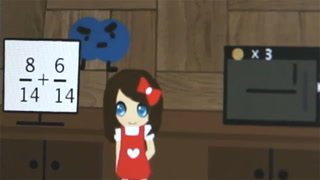
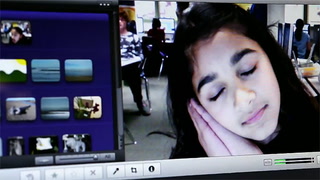
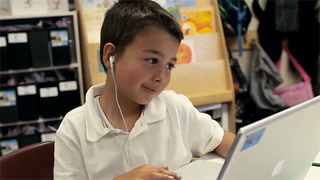
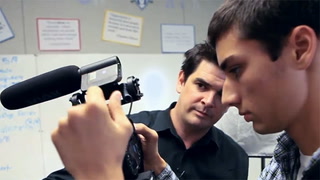
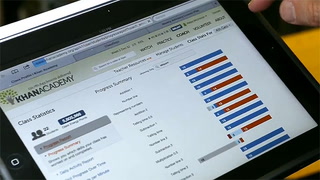
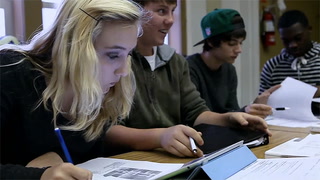








2 Comments
barbara goemans May 5, 2017 5:54pm
THUY TRUONG Sep 15, 2012 10:20pm